Books

What is the meaning of life? If people didn’t believe in God, what would keep them from killing and stealing and other dreadful things?
Beyond the Gods isn’t in the business—as it makes clear from the outset—of trying to get people to believe, or disbelieve, anything at all. It is here, instead, to serve the many people who have already ceased to believe in any celestial beings and other forms of the supernatural. Or who find themselves harboring very strong doubts about everything from little superstitions to fully-established religions. But who haven’t had the time or the chance to develop entirely secular ways to answer such questions as the above. In this book, it is done.
How can you live without believing in anything? Can miracles be accounted for? How can we face death?
For all those who see the “answers” given by religion to all such queries as illusions devised to cover up a natural ignorance, or to give the questioners a feel-good sop—or, alternatively, to scare them—Beyond the Gods proceeds to show how they can be handled, one by one, without an otherworldly contrivance in sight. Its instrument is no-nonsense logic, its method easy language, wit and a light touch.
While this book isn’t primarily a rationale for atheism, it includes that too, along the way—see, for example, its rundown of different kinds of danger created by religion. Yet its main thrust remains to complement that kind of material, with its easy how-to approach to life’s Big Questions, after the gods have departed.

Have you ever been dismissed by a doctor?
The American Healthcare system is chock-full of missed diagnoses and, when doctors dismiss patients and assign misdiagnoses, monsters are made.
This unprecedented collection shines a light on the link between monsters, medical gaslighting, and chronic pain to remind us we are all only a diagnosis away from our own horror story.
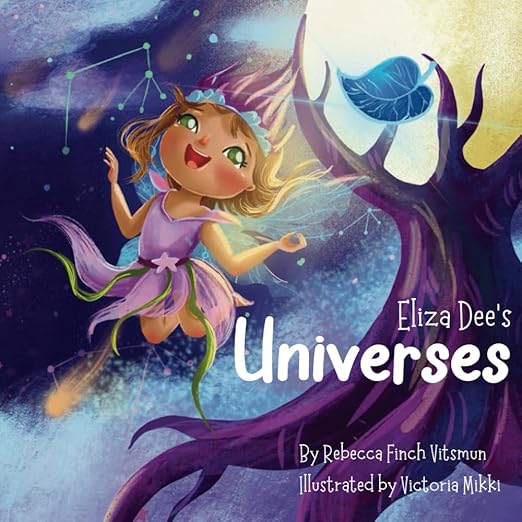
Eliza Dee loves astronomy and pondering the universe’s greatest mysteries.
Along the way, she discovers where science ends, imagination begins.

In a quiet and unassuming way, Contraduction is utterly brilliant. Every page has a thought so deep and unexpected that it stops you in your tracks, as you not only realize, “That’s a different, really interesting way to think about the world, exactly the opposite of how I normally view things” but also, “And it is absolutely equally valid (and enriching) to adopt this opposite way of thinking.” I loved this book. — Robert Sapolsky, author of The Blank Slate and Determined.
With Contraduction, Dan Barker gives us a new word—and a new way of looking at things. I thoroughly enjoyed this! So much to think about—and it made me laugh. What else could I ask for? — Kate Cohen, contributing columnist for the Washington Post and author of We of Little Faith
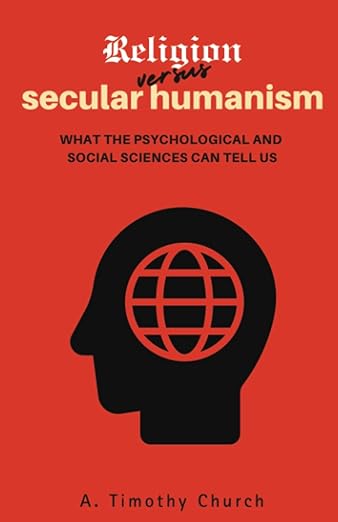
In today’s contentious climate—in which a seemingly unbridgeable gap between religious and secular worldviews persists—this book discusses the relative merits and viability of religion versus secular humanism from the perspective of the psychological and social sciences. Among the questions asked: Are there plausible naturalistic (vs. religious) explanations of the origins, evolution, and functions of religion? What are the beneficial and harmful effects of religion and can the benefits be adequately achieved via secular means? Can secular humanists live moral, meaningful, and fulfilling lives, or is the fully secular life deficient in some way? Can psychological science show us how to live meaningful and fulfilling lives, with or without religion? As much of the world secularizes, is religion likely to persist? Should it? Evidence-based proposals to reduce the religious-secular gap are also offered. The discussion is non-polemic and accessible to inquisitive lay people.

Humanity is undergoing an historic change. It is a change in our self-conception, and our understanding of our place within the cosmos. The last several centuries have seen the growing influence of an increasingly secular perspective, one which places us squarely in the natural order. This turn away from religious, supernatural, and superstitious thinking, towards an increasingly naturalistic and scientific perspective, is itself the cause of genuine, holistic progress for human civilization. It is this dynamic moment, this revolutionary shift from faith to reason, which is the focus of Rise of the Nones: The Importance of Freedom from Religion.
This work weaves together the important themes of evolution, secularism, and progress, uniting them into one comprehensive argument. Rise of the Nones is a hope-filled, enlightening, insightful work, an excellent rational antidote to two millennia of toxic religious misanthropy.

The people of Visryan, a global theocratic superpower, lead lives unencumbered by the fear of death. Vexrus, the deity ruling over them, offers a simple deal to his followers: serve the state in your earthly life, and be rewarded in the next. One’s afterlife status can even be tracked online.
When his friend and co-worker is executed for heresy and possessing banned materials, Marlow Wilson, a faithful bureaucrat working for the Department of Public Spending, investigates, hoping that exposing misconduct will yield afterlife credit.
The banned materials, however, call his once-unwavering faith into question, forcing him to reevaluate many of the State institutions he once held sacred. Without god, many aspects of society that would normally be considered necessary to further the noble goal of helping the masses enter eternity, become sinister.

Annie Maple was a 29-year-old San Francisco underachiever, a college dropout living in the shadow of her genius older brother. Then she died and went to Hell—the classic Christian Hell, with fire and sulfur and devils, a place she never imagined might truly exist. Annie can’t remember how she died or why she was sent there. But the systems governing Hell are starting to run down, giving her a chance to escape.
Joining other “shaken loose” souls from different eras in search of an exit, Annie treks across volcanic deserts, flees marauders, and confronts an existentially depressed Satan. Hell, she learns, is an unjust place filled not only with truly evil people, but also with billions of average souls who simply didn’t happen to be Christian. Seeking the courage to transcend her past failures, Annie must ultimately choose between returning to life and challenging this system of divine injustice.
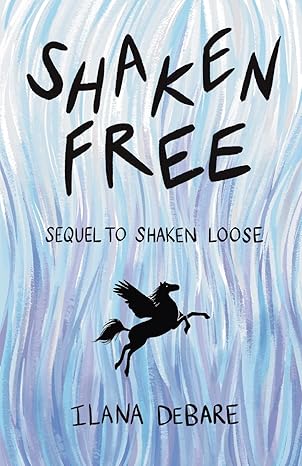
She went to Hell and returned to life. Hell was the easy part.
Annie Maple died, went to Hell, then escaped back to Earth through a mysterious portal. But amidst her gratitude, she is painfully alone: no one believes her story of visiting the afterlife. When unexpected tragedy strikes, Annie returns to Hell with old and new allies—the Hun horseman Trua whom she loves, the fumbling revolutionary Haisheng, and Kezia, a devout Christian widow with losses of her own. As Annie learns that the systemic ruptures in Hell go far beyond her own “shaking loose,” she embarks on a quest to protect earthly life and answer the question: how can a supposedly just God permit a universe with so much injustice?

Better Than a Turkish Prison is the true story of a needy young man who encounters a religious cult known as "The Twelve Tribes". With no better options in sight, he decides to join them in their pursuit to build the kingdom of God on Earth.
After years of brainwashing and servitude, he must break free from a powerful delusion in his search for freedom and truth. Not merely a deeply personal portrayal of one man's struggles, this book also serves as a critical analysis of religious ideals and their effects on humanity as the author divulges his presently held beliefs.


Deborah Ester wakes to a shrill cackle. Her last memory vague, she finds herself bound to a metal pole in a small prison cell. Her captor is a maniac. Though unpredictable, he exhibits an unusual talent. One that brings him, and Deborah, to pivotal and twisted moments in history.
Among others, Deborah is brought to the Jurassic period, to London during the time of Jack the Ripper, and, more curiously, to the Crucifixion of Jesus, the offering of Isaac by Abraham, and the Massacre of the Innocent. Deborah learns the necessary role she plays in each of these events, and how her captor has influenced history himself.
Deborah would never choose this of her own free will, but does she actually have free will if it means destroying the history that is responsible for her own existence?
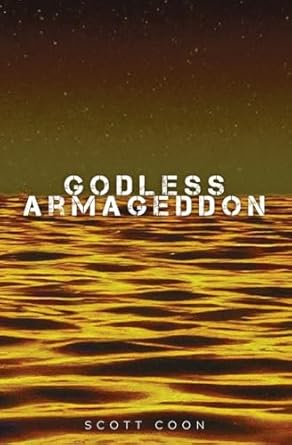
After Thom dies, he uses weaponized memories to battle two false gods bent on Armageddon, as well as his own deeply repressed homosexuality.
Thomas Jefferson Stoneshield VII dies in World War II and enters a godless afterlife where souls are clouds upon a golden ocean surrounding the Earth. He blames himself for ending the legacy carried in his name. He doesn't know why he never married because he's buried it too deep: Thom is gay.
To help him, Thom's dad reaches out from inside a soul well—a monster made of captured souls. But his dad is unable to communicate. Instead, Thom keeps rewatching his dad's death in World War I, while his dad keeps apologizing for something. Determined to rescue his father, Thom teaches himself how to fight the soul wells with weaponized memories. His fellow soldier, David Lowenstein, wants to save his parents. Others want Thom to stop the soul wells before they unleash Earth's Armageddon and consume all souls, living and dead. But Thom just wants to save his dad and atone for ending his family name.
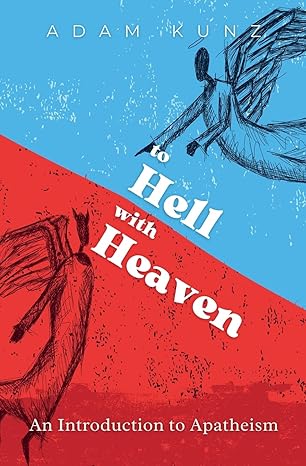
The population of the United States is becoming less and less affiliated with any religion, at the same time that national, state, and local governments are considering policies that elevate religious freedom over other civil rights and liberties. Meanwhile, religious extremism and religiously motivated violence are steadily rising. In these vigorous debates, the loud voices of extremists drowned out religious and irreligious moderates. As the so-called “faithful” demand more and more accommodations for their beliefs, are large percentage of the population is on the sidelines. How should this “silent majority” of moderates approach such a pressing national conversation?
In To Hell with Heaven, Dr. Adam Kunz offers a solution: apatheism. A combination of the words “apathy” and “theism,” this attitude meets religious claims with indifference. In his part-philosophical, part-autobiographical account, Dr. Kunz explains what apatheism is and how it differs from its opposite, religious zealotry. Drawing from his own experience leaving Mormonism, he argues that when it comes to religious extremism, rather than “fight fire with fire,” moderates should embrace passive resistance. Instead of accepting the high-energy, apocalyptic narratives of zealots, Dr. Kunz invites moderates to counter it with their own narrative – that zealot thinking and sectarian debates should take a backseat to much more pressing issues. Ultimately, this book empowers believers and non-believers to look extremists in the eye and, as with a playground bully, declare: “I don’t care.”

One night, during a bedtime read of The Lion, The Witch and The Wardrobe, Bitsy asked, "Is Aslan evil?" This innocent question led to many bedtime-delaying discussions about life, morality, and biblical fundamentalism.
In her book, Bedtime with Bitsy: A Critical Read of the Chronicles of Narnia, Alexis Record applies the deconstruction skills she learned in her journey out of faith to C. S. Lewis' Christian allegories for children. Follow Alexis and Bitsy as they discuss the magical world of Narnia through the critical eyes of a very curious 9-year-old.
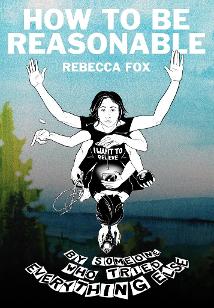
A quirky, smart comic which introduces an essential set of critical thinking skills that even the most reasonable reader will benefit from.
The world is a confusing place and every day there is more information we have to sort through. It pours endlessly from our screens, our leaders, our friends, and from posters taped to lamp-posts. Rebecca was overwhelmed and anxious in the face of this deluge until she found reasonableness. Unlike so many techniques and trinkets that promise empowerment, the critical thinking skills presented in How to be Reasonable will make you more confident, cautious, and effective – and maybe even happier.
How to be Reasonable (By Someone Who Tried Everything Else) encourages readers to embrace reason and evidence with a combination of clear, well-researched guidance, and witty asides. Fox’s illustrative style and personal story enriches the experience and will evoke many wry smiles.

He has written or edited more than 30 books, his arguments for God and Jesus are frequently cited by Christian apologists around the world, and he has severely overstated his case through a series of blatant mischaracterizations and philosophical blunders.
You may have heard of William Lane Craig, a professor of philosophy at Talbot School of Theology who is known for debating atheists, but even if you haven’t you have probably heard his arguments through followers and fans. He is known for painting faith as the “reasonable” road, and falsely claiming that he can prove the validity of his religion.
From his work attempting to show evidence for Jesus’ resurrection to his development of the Kalam cosmological argument for the existence of God, Craig is respected among his peers on the Christian side of the religious spectrum. But is that deserved? What’s at the core of these arguments? Are they philosophically sound? More importantly,is thisUnreasonable Faith?
"an excellent destruction of W.L. Craig’s entire apologetics. Cogently argued and factually accurate, this is required reading for anyone keen to question the soundness of anything W.L. Craig has argued over the decades. Which makes it an invaluable resource for refuting Christian apologetics generally."
Richard Carrier, author on the historicity of Jesus.
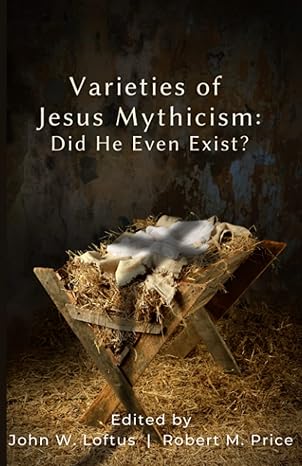
To most people on the planet, the existence of Jesus is a given: “Of course he did!” They take it for granted that he existed simply because it reaffirms their faith. But to the rest of us who don't believe in a supernatural Jesus, the question of the historicity of Jesus is not simple. There are thousands of different ideas about to what extent the Jesus tales were based on a real man, or men, or woman… Did Jesus even exist, and if not, what best explains the rise of such a character in the New Testament?
That is where John W. Loftus and Robert M. Price come in. Each with decades of experience in the fields of theology and Christian history, Loftus and Price have compiled essays from some of the top authorities on Jesus mythicism to establish the world's first academic catalogue of mythicist beliefs. Experts who provided chapters include David Fitzgerald, Joseph Atwill, Michael Lockwood, and more!
The question is no longer simply, "Did Jesus even exist?" In this compilation, you'll find yourself questioning everything about the Christ story and how it truly began.

For as long as the idea of “miracles” has been in the public sphere, the conversation about them has been shaped exclusively by religious apologists and Christian leaders. The definitions for what a miracles are have been forged by the same men who fought hard to promote their own beliefs as fitting under that umbrella. It’s time for a change.
Enter John W. Loftus, an atheist author who has earned three master’s degrees from Lincoln Christian Seminary and Trinity Evangelical Divinity School. Loftus, a former student of noted Christian apologist William Lane Craig, got some of the biggest names in the field to contribute to this book, which represents a critical analysis of the very idea of miracles.
Incorporating his own thoughts along with those of noted academics, philosophers, and theologians, Loftus is able to properly define “miracle” and then show why there’s no reason to believe such a thing even exists.
Addressing every single issue that touches on miracles in a thorough and academic manner, this compilation represents the most extensive look at the phenomenon ever displayed through the lens of an ardent non-believer.
If you’ve ever wondered exactly what a miracle is, or doubted whether they exist, then this book is for you.

Disproving Christianity and Other Secular Writings compiles popular and lesser-known arguments against the principles established by the Christian canon.
Using a phenomenological approach to build his case based on in-depth study at the University of California, Santa Barbara, McAfee analyzes the Hebrew Scriptures and New Testament doctrine to build a logical and reasonable case against their validity. From contradictions between lived and portrayed religions to factual errors within the texts themselves, no stone is left unturned in this fully updated and expanded refutation of Christianity.

The Bible is considered to be one of the bestselling books of all time, but what is really in it? What does it actually say?
The Bible Says What!? is a direct and critical look at the Bible itself, exploring some of the most undefendable stories and ideas within it.
In this book, you will encounter harsh criticisms and hard truths, looking deeper into the verses that your local pastors refuse to address from the pulpit. This book is for the Christian who is not afraid to take that arduous journey into their own beliefs and challenge them. This book is for the atheist seeking information to use in their everyday conversations with Christians. It's for the casual reader who is merely curious about what is in the book that Christians follow. This book is for you.
